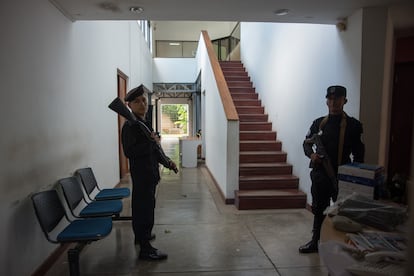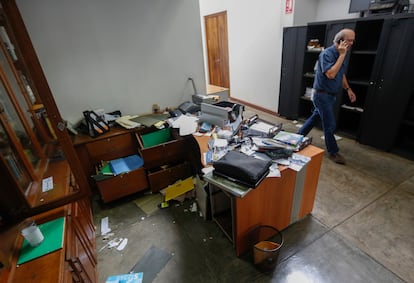How the Nicaraguan government is suppressing freedom of the press
The editor of the newspaper ‘Confidencial’ recounts how his officers were seized and repurposed by President Daniel Ortega in an open attack against independent media

At midnight on December 13, 2018, Nicaragua’s National Police force stormed the offices of Confidencial and Esta Semana, the publications I have edited for the last 25 years. They seized our computers, cameras and editing equipment, along with private documents including our accounts.
There was no judge’s order or warrant to justify the raid, though we knew there was an unwritten order from the head of police: Nicaragua’s President Daniel Ortega.
A day later the officers returned, this time to occupy our offices permanently. They waited until Christmas Eve to do the same to the independent television channel 100% Noticias, arresting editor Miguel Mora and editorial chief Lucía Pineda. These two colleagues spent six months in jail and were subjected to a political trial where they were accused of “terrorism” and “inciting hatred,” just for doing their jobs as journalists.
Our editorial team may not be between those four walls but we are present in the hearts and minds of our reporters, and in the promise we have made to tell the truth at whatever cost
Journalism became a crime under the family dictatorship of President Ortega and his wife, Vice President Rosario Murillo. Attacks on independent publications began when protests erupted in April 2018, and tens of thousands of people streamed onto the streets to demand the government step down, armed only with cellphones and national flags.
The presidential couple responded with a lethal crackdown that left 325 people dead, put hundreds more in jail as political prisoners and pushed 100,000 citizens into exile.
Meanwhile, independent reporting was to be suppressed, through censorship, physical attacks on journalists, and legislation designed to shore up a police state.
On New Year’s Day of 2019, I went into exile in Costa Rica with my wife, for my own physical safety and to ensure our journalism could continue. With our offices still occupied by the police in Nicaragua’s capital, Managua, my editorial team was spread out across San José, Miami, Mexico and San Salvador – but we never stopped reporting.

On three separate occasions, Nicaragua’s Supreme Court admitted our requests asking the court to halt the occupation of our offices. Despite proof of its illegality, the court failed to rule in time on our requests. I returned to Nicaragua at the end of 2019, with no idea if my rights would be respected.
Two years on from the occupation of our offices, the regime installed a sign in front of the building announcing the property had been confiscated by the Health Ministry, in flagrant violation of the law and Constitution. Confidencial and Esta Semana are now mothers’ home, and the studios of 100% Noticias were reopened as a center for alcohol and drug addiction.
These crude attempts to seal the closure of independent media outlets and human rights organizations are crimes against the right to expression and a free press. Just like organized crime bosses, Ortega and Murillo have tried to launder their dirty work with these “reopenings.” They have tried to present the seizure of a newspaper as an act of generosity, as if the health services the state must provide were instead gifts from the regimen. But they have left their fingerprints all over the crime scene: now two portraits of the president and vice president look down over the newsroom where we once debated how to report power and corruption. There are now two symbols of censorship in a place that always fought for press freedom. The government has violated Article 44 of the Constitution which clearly states that “confiscating private property is forbidden.”
The press is the final guardian of freedom, and its last defenses reside in the trust of its readers
This attempt to erase the collective memory of a media outlet is seen by everyone for what it is: a monument to crimes against the liberty of journalists. But brute force of this kind will not silence Confidencial. Since the day we were raided in 2018 and through this illegal confiscation of our property, we have never stopped informing the public and acting as a check on power. Our editorial team may not be between those four walls but we are present in the hearts and minds of our reporters, and in the promise we have made to tell the truth at whatever cost. We will not submit to censorship.
That said, Confidencial’s resistance would not be possible without the support of our audience. In a country where for more than a decade authoritarianism has bulldozed human rights and democratic institutions, the press is the final guardian of freedom, and its last defenses reside in the trust of its readers.
Together with the users of social networks, we will beat state censorship. However, we still have to face up to the intimidation and self-censorship that affect all sectors of society, in order to overcome fear and win the battle for truth. This is the only path that leads to democratic change.
Sooner than later, we will tell one of the greatest stories of the 21st century: how Nicaragua’s last dictatorship ended. And from then we can start reporting on the construction of a new democratic republic, where justice lives and impunity is gone.
Tu suscripción se está usando en otro dispositivo
¿Quieres añadir otro usuario a tu suscripción?
Si continúas leyendo en este dispositivo, no se podrá leer en el otro.
FlechaTu suscripción se está usando en otro dispositivo y solo puedes acceder a EL PAÍS desde un dispositivo a la vez.
Si quieres compartir tu cuenta, cambia tu suscripción a la modalidad Premium, así podrás añadir otro usuario. Cada uno accederá con su propia cuenta de email, lo que os permitirá personalizar vuestra experiencia en EL PAÍS.
¿Tienes una suscripción de empresa? Accede aquí para contratar más cuentas.
En el caso de no saber quién está usando tu cuenta, te recomendamos cambiar tu contraseña aquí.
Si decides continuar compartiendo tu cuenta, este mensaje se mostrará en tu dispositivo y en el de la otra persona que está usando tu cuenta de forma indefinida, afectando a tu experiencia de lectura. Puedes consultar aquí los términos y condiciones de la suscripción digital.









































